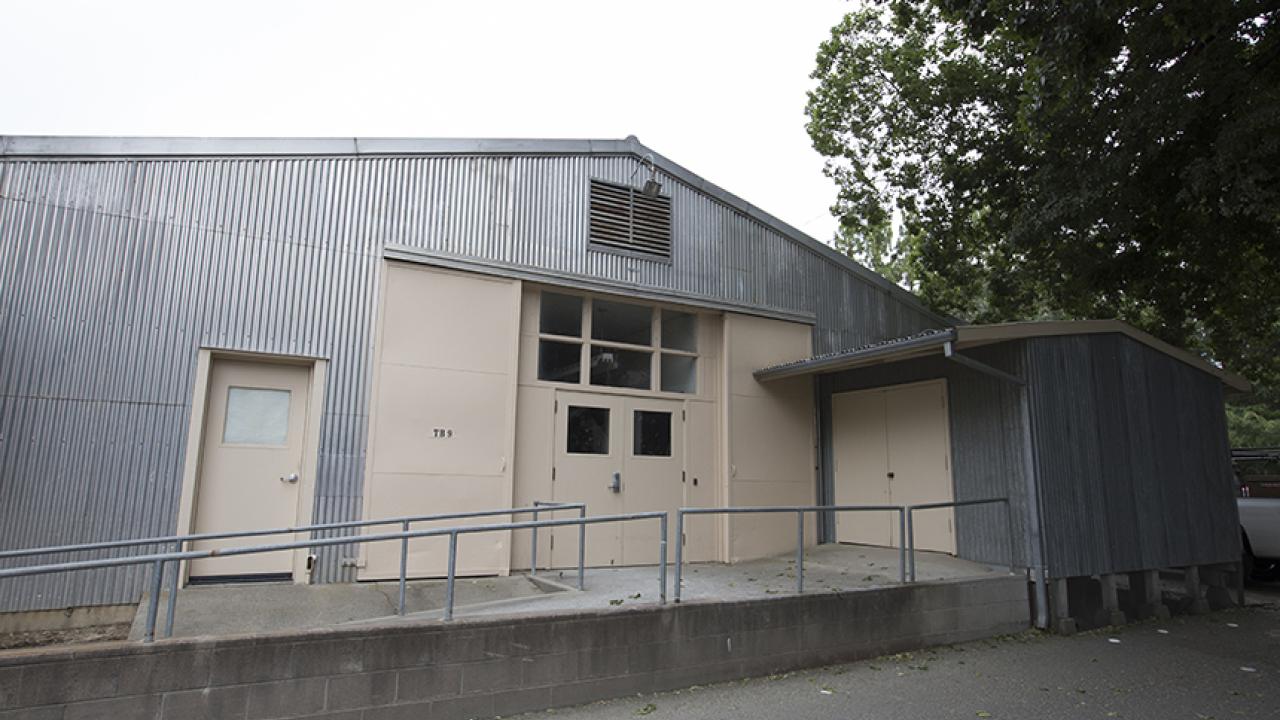Quick Summary
- Vintage art studio named to national and state historical registers
- Building gave rise in the ’60s to Thiebaud, Arneson and other young artists
- Budding art department was a freewheeling place for exploration
During the 1960s the University of California, Davis, began building an art department that turned out like no other. Much of that early work took place in Temporary Building 9, a metal structure at Old Davis Road and Hutchison Drive. TB 9 — as it was dubbed — has been nationally recognized for its importance in art history with its inclusion on the National Register of Historic Places and the California Register of Historical Resources.
Founding art department Chair Richard Nelson hired a group of young artists, among them Wayne Thiebaud, Robert Arneson, William Wiley, Roland Petersen, Roy De Forest and Manuel Neri, and gave them the freedom to create at a place free from many distractions and rules. Arneson, who did groundbreaking work in ceramic sculpture, is most associated with TB 9, where the university’s ceramics facilities are located. He taught at UC Davis from 1962 until the year before his death in 1992.
“I’m thrilled and so excited about this,” said Annabeth Rosen, professor of art in the UC Davis Department of Art and Art History, who has served as the Robert Arneson Endowed Chair since 1997. “This distinction for TB 9 is a symbol; it is about the contribution of the art department since its inception. TB 9 is an example of the power of place to inspire. It was an important place for many people and they come back to visit all the time. This is a great opportunity to draw attention to the arts, the importance they have and role they continue to play at UC Davis.”
The historical designation for TB 9 came about through the work of Jane Ellen Higgins as part of her master’s thesis in history at California State University, Sacramento.
“The building is important within its historical context of association with an art movement and an internationally significant artist,” said Higgins, who is on the city of Davis Civic Arts Commission. “Much of Arneson’s seminal work was done in TB 9. Having the designation accepted by the federal government was just the icing on the cake.”
The designation offers certain protections, but doesn’t guarantee that a building cannot be modified or destroyed.
Constructed from surplus military buildings in 1947, TB 9 was originally used as student housing. In its first few years the art department shared the building with mail services and food science.
A founding figure of the “funk” art movement, Robert Arneson’s work was frequently funny, but also had significant and darker political and personal content. Along with ceramics, he also produced drawings and prints and taught classes across a variety of disciplines. Nearly 25 years after his death, the artist’s presence at UC Davis is seen daily in the popular Egghead sculptures across campus.
While TB 9 is best known for the ceramics that students and faculty still produce there, it was also home to a metal casting foundry and served as a gathering place for artists during all hours of the day and night. The art program at UC Davis was a freewheeling place where boundaries were crossed, and faculty members had their own distinct styles and approaches to teaching and making their art. Today, it remains open to a wide range of ideas and is a place where students are encouraged to explore multiple mediums.
“Many sculptures, paintings and drawings were made in TB 9 by many students and faculty, and that was the real strength and contribution of TB 9,” said Sandra Shannonhouse, Robert Arneson’s widow and an artist who graduated from UC Davis and worked in the building. “It was a place that any kind of art could be and was made. What was important is that you were true to your own vision, developed it and could articulate your position. This is crucial to understanding the real strength of the art department and what has and continues to happen there.”
An examination of the art department’s legacy will be part of the Jan Shrem and Maria Manetti Shrem Museum of Art opening later this year at UC Davis.
Learn more about the National Register designation, TB 9 and the Department of Art and Art History:
- Listing on National Register of Historic places
- Robert Arneson and the Eggheads
- Department of Art and Art History
- Guide to public art at UC Davis
- UC Davis artistic legacy at Manetti Shrem Museum of Art site
- Master’s thesis/historic designation
- UCOP video on art in collection
- Video interviews about early years of art program
- UC Davis at SF MOMA
- UC Davis at Oakland Museum
Media Resources
Jeffrey Day, Division of Humanities, Arts and Cultural Studies, 530-219-8258, jaaday@ucdavis.edu
